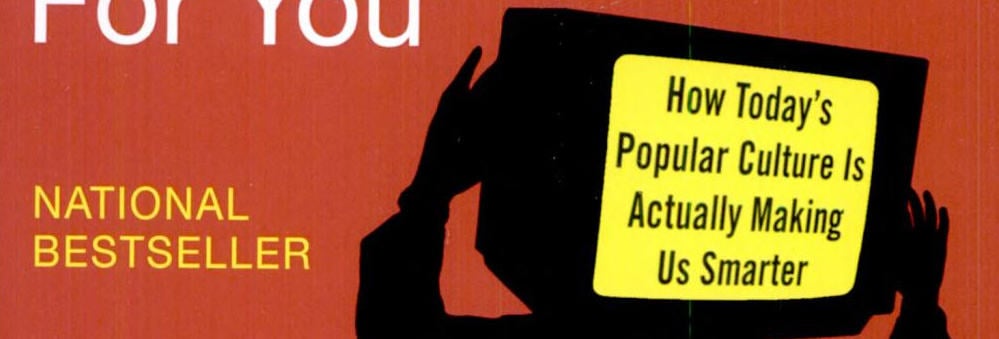A great thing about reading books is finding smart people. I first realized this reading Malcolm Gladwell a decade ago and thinking “Wow, this guy is really smart,” and the same thing when I finished Steven Johnson’s Everything Bad is Good For You. The conclusion of this book is that your vice, while not nice, may not be so bad. A secondary takeaway is to think about reframed, redefined, and updated views and when we do this we can see where things are going rather than where they’ve been.
Johnson’s premise is that popular culture is actually making us smarter, but in a not so easy to measure way. Johnson argues that watching TV, interacting online, and playing video games builds soft skills that are important. He suggests that watching Friends actually builds friendship skills. Friends recently came to Netflix, so at my house we are building a lot of these skills right now. Watching it means we probably pick up on interpersonal nuances, judge emotions, and consider what it’s like to live with people who do dumb things. Even though episodes are squarely wrapped up in a trite 22 minutes, anyone who’s seen it knows how long it took Ross and Rachel to finally see what was in front of them the whole time. Those are skills we need as people too.
Everything Bad Is Good For You doesn’t feature Friends, but rather other higher-level shows. Johnson compares the intricate plots of shows like 24, Lost, and The Sopranos to the previous programming like Dallas or Starsky and Hutch. Johnson graphs plot complexity and character count like a doctor might show a patient their HDL cholesterol level. As you read along you start believing that more is better. Current shows have more complex and longer story arcs that require us to pay attention, consider the options, and weigh what we know about the show.
The best case Johnson makes is that of video games. Both Tyler Cowen and Jane McGonigal go into the nuances better (though each wrote books much later and had more data and stories to go on) but Johnson’s offers a nice introduction about what games teach us. He gives examples about the decision and problem solving skills that games offer. For each example Johnson gives explicit examples of the meta-learning that may be taking place. Learning that a double mushroom makes you run faster has no practical application, not even if you literally began a Super Mario diet. What you actually get is a boost in problem solving. Knowing you have an asset to use at the right moment, is the type of thinking that Johnson proposes is valuable.
For as strong as his argument is, his conclusion is weak. This isn’t his fault though. There is no good data on measuring whether soft, meta, abstract skills are increasing along with the complexity of popular culture. Johnson graphs story arcs to show more lines now than twenty years ago, but lacks the data that concludes it is so. It’s like driving a car and pushing on the accelerator but not seeing the speedometer move.
You’ll probably enjoy Everything Bad Is Good For You if you like thinking about the benefits of popular culture, technology, or other works by Johnson.
For further reading about the what skills matter – soft or hard – Tyler Cowen’s Average is Over is a good place to see what an economist thinks the future may require. For reading about other online skills (and using those skills to make offline life better), read Jane McGonigal’s Reality is Broken.


